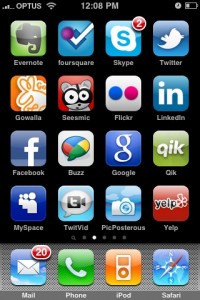Last week, Nick Leeder, Google’s Australia and New Zealand Managing Director announced that there are three big changes heading for the web that we must be aware of at Google for Entrepreneurs Day in Sydney. One of these changes was the idea of mobility, and that Google will hold mobile considerations among the top priorities for development for the company. Leeder also mentioned that we as citizens should avoid restricting ourselves to only our smartphones and tablets for mobility, hinting that there may soon be other devices that we have not thought about that will provide easier mobility (Coverage of this speech is available here).
This news didn’t come as much of a surprise to me, considering we live in the era of smartphones coming out with ways to link to our online profiles more and more seamlessly. It is clear that mobility is the goal of all social networking sites, since it enables users to stay connected no matter where they go. Twitter, for example, was originally intended as a way to use text messages to connect with a group and not just the one person you were texting. The 140-character limit still promotes brief, precise messages that force users to be creative and to the point (I still struggle with this) and is very easy to use on-the-go. Clearly, the creators of Twitter had mobility in mind, and we are all aware of Facebook and Pinterest apps (to name a few) that allow us to take our social networking with us on-the-go.
What concerns me the most about this drive for mobility is news that surfaced just this morning about European regulators finding legal problems in Google’s recently revised privacy policy, making claims that Google being able to combine personal data from such a large network of people puts the privacy of users at risk. Essentially, Google has made it easier for themselves to tie together user information from multiple services, painting a better picture of its users and allowing for more personalized advertisements (more information can be found here). If Google is trying to paint a better picture of its users by giving itself access to more information about what services its users are using, then mobility is exactly what Google needs to improve on to make that happen. Not only will users stay connected to their services around the clock, but Google will be able to determine where we are using these services and with whom we are using these services.
Being able to connect to social networking services and other other internet sites has provided a lot of benefits in my life, and often times it is more convenient to pull out my iPhone instead of finding the nearest computer. It is important to acknowledge, however, that Google and other companies are on a mission to find out as much information as possible about you, the user, and increasing mobility of its services allows Google to track its users’ patterns everywhere its users go. Scary, if you ask me. Almost Big Brother-ish. Luckily there are regulators out there who are aware of Google’s strategies and concerned with preserving the privacy of users, because I am sure almost all of us rely on several online services in our daily lives and are not in a position to completely change the way we use these services.
Does anyone else find it alarming that this push for mobility has come at the same time that Google changed its privacy policy to allow for more access to its users’ personal information? Seems like Google made its goal pretty evident with this recent move.


I belive that this is indeed a problem. Why does everything need to be mobile in this day and age. Yeah google benefits, but so do we in some way, wherever our devices go, our social networks can go…But I don’t feel like that is a good way to run social and buisness connections. What happened to the office, and the home. Every day you went to your office, or workspace and worked until you left, then you went home and interacted with your family. today we have more and more cases of people using the office as an extension of the home (keeping up with friends and family on facebook and other social media during buisness hours.) and the home as an extension of the office (making buisness calls while spending quality time with thier family). What good does this do us? other than to isolate us from the people nearby and connect us to those faraway?
Yeah that’s very true, and I’m sure Zadie Smith would point this out as well that this just promotes us losing our personal connections with people. You even hear of professional athletes tweeting while they are on the sidelines, or actors tweeting while they are on the set filming. The distinction between a profession and a social life is blurred by the mobility of social networking. Thanks Phil!